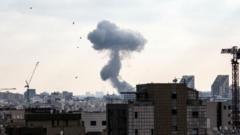The situation escalates following U.S. strikes on Iranian nuclear sites, with growing fears of further military confrontations in the region.
**Escalating Tensions: U.S. Strikes on Iran's Nuclear Sites and Iran's Response**

**Escalating Tensions: U.S. Strikes on Iran's Nuclear Sites and Iran's Response**
The ongoing conflict between the U.S. and Iran intensifies as military strikes disrupt Iranian nuclear capabilities and provoke fierce retaliation.
On June 22, 2025, U.S. military forces conducted precision strikes against three of Iran’s nuclear facilities, a move that has significantly heightened tensions in the Middle East. The Pentagon reported that the strikes caused “severe damage” to key sites at Fordo, Natanz, and Isfahan. Despite claims from President Trump of complete destruction of these sites, officials admitted it was too early to ascertain whether Iran still possesses nuclear capabilities.
In a recent televised address, Trump characterized the operation as a collaborative effort with Israel to dismantle Iran's nuclear ambitions, reinforcing his stance that there would be profound consequences if Iran continued its aggressive behavior in the region. This action has stirred uproar among Iranian officials, with the regime vowing to retaliate fiercely, asserting their right to defend national sovereignty.
Meanwhile, a statement from Iran's Foreign Minister, Abbas Araghchi, indicated that the country is assessing the damage and considering various methods of retaliation, though he refrained from disclosing specific plans, underscoring a strategy focused on self-defense.
The strikes have fueled anxieties among U.S. military personnel stationed in the region, with over 40,000 actively deployed. Experts anticipate that American bases will be primary targets for Iranian reprisals, particularly as tensions from the longstanding conflict with Hamas simultaneously dominate public and governmental attention in Israel.
As the Israeli government declared that the military operations against Gaza will continue, there is apprehension that Iranian responses may lead to a larger, more prolonged conflict. According to the Israeli military, the civilian casualties in Gaza have mounted to over 500 since the outbreak of renewed hostilities.
Reports from Iran indicate plans to make advancements in their nuclear capabilities following assertions of a new, undisclosed site for uranium enrichment, further complicating the already tense geopolitical landscape. The U.N.'s nuclear watchdog confirmed that there are currently no signs of radiation leaks following the U.S. attacks, but the ramifications of these military actions remain uncertain.
This escalation raises the specter of broader military engagements, as the Iranian leadership considers how best to navigate the situation, balancing the desire for retaliation with the risks of provoking further violence that might threaten the regime itself.
In a recent televised address, Trump characterized the operation as a collaborative effort with Israel to dismantle Iran's nuclear ambitions, reinforcing his stance that there would be profound consequences if Iran continued its aggressive behavior in the region. This action has stirred uproar among Iranian officials, with the regime vowing to retaliate fiercely, asserting their right to defend national sovereignty.
Meanwhile, a statement from Iran's Foreign Minister, Abbas Araghchi, indicated that the country is assessing the damage and considering various methods of retaliation, though he refrained from disclosing specific plans, underscoring a strategy focused on self-defense.
The strikes have fueled anxieties among U.S. military personnel stationed in the region, with over 40,000 actively deployed. Experts anticipate that American bases will be primary targets for Iranian reprisals, particularly as tensions from the longstanding conflict with Hamas simultaneously dominate public and governmental attention in Israel.
As the Israeli government declared that the military operations against Gaza will continue, there is apprehension that Iranian responses may lead to a larger, more prolonged conflict. According to the Israeli military, the civilian casualties in Gaza have mounted to over 500 since the outbreak of renewed hostilities.
Reports from Iran indicate plans to make advancements in their nuclear capabilities following assertions of a new, undisclosed site for uranium enrichment, further complicating the already tense geopolitical landscape. The U.N.'s nuclear watchdog confirmed that there are currently no signs of radiation leaks following the U.S. attacks, but the ramifications of these military actions remain uncertain.
This escalation raises the specter of broader military engagements, as the Iranian leadership considers how best to navigate the situation, balancing the desire for retaliation with the risks of provoking further violence that might threaten the regime itself.























